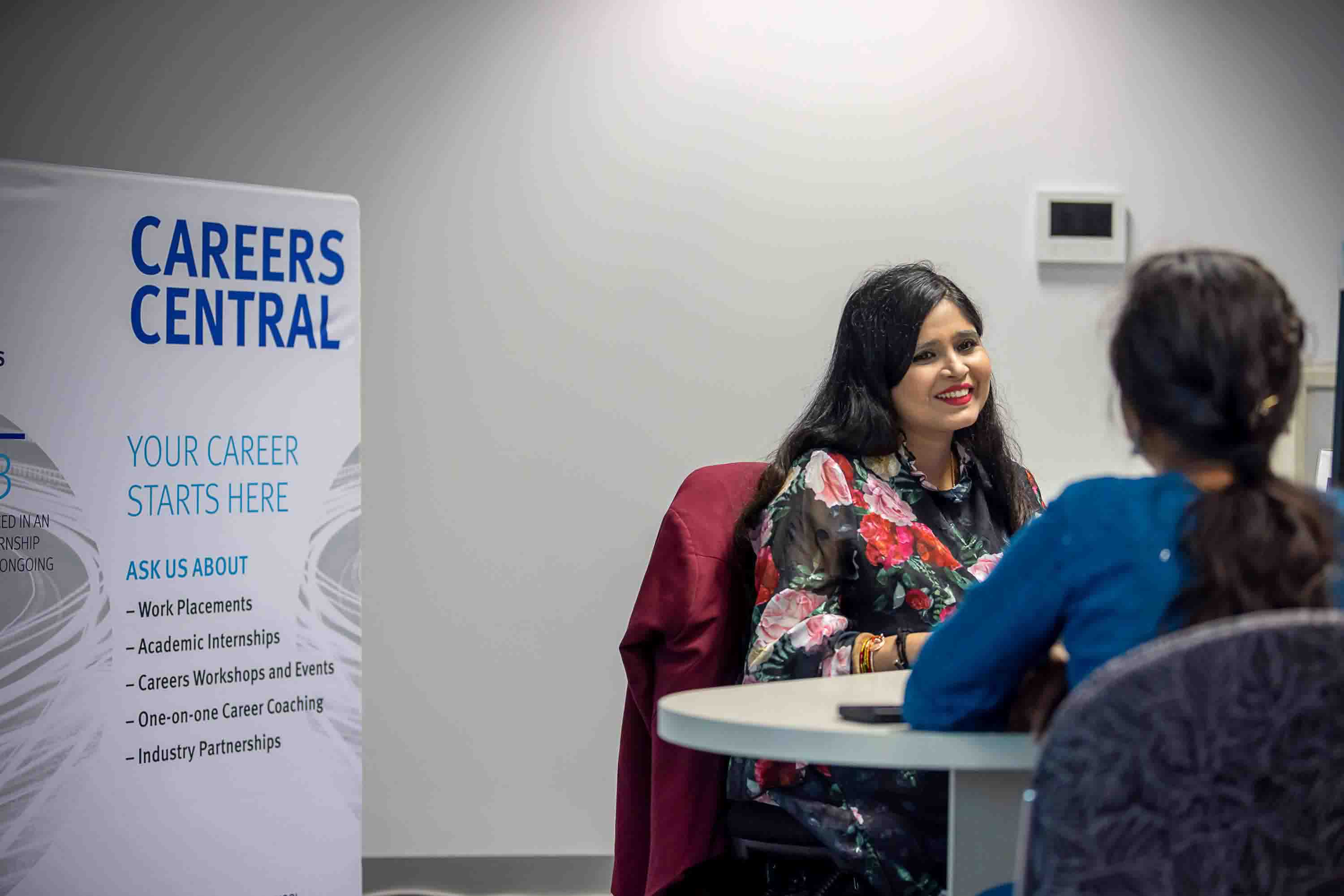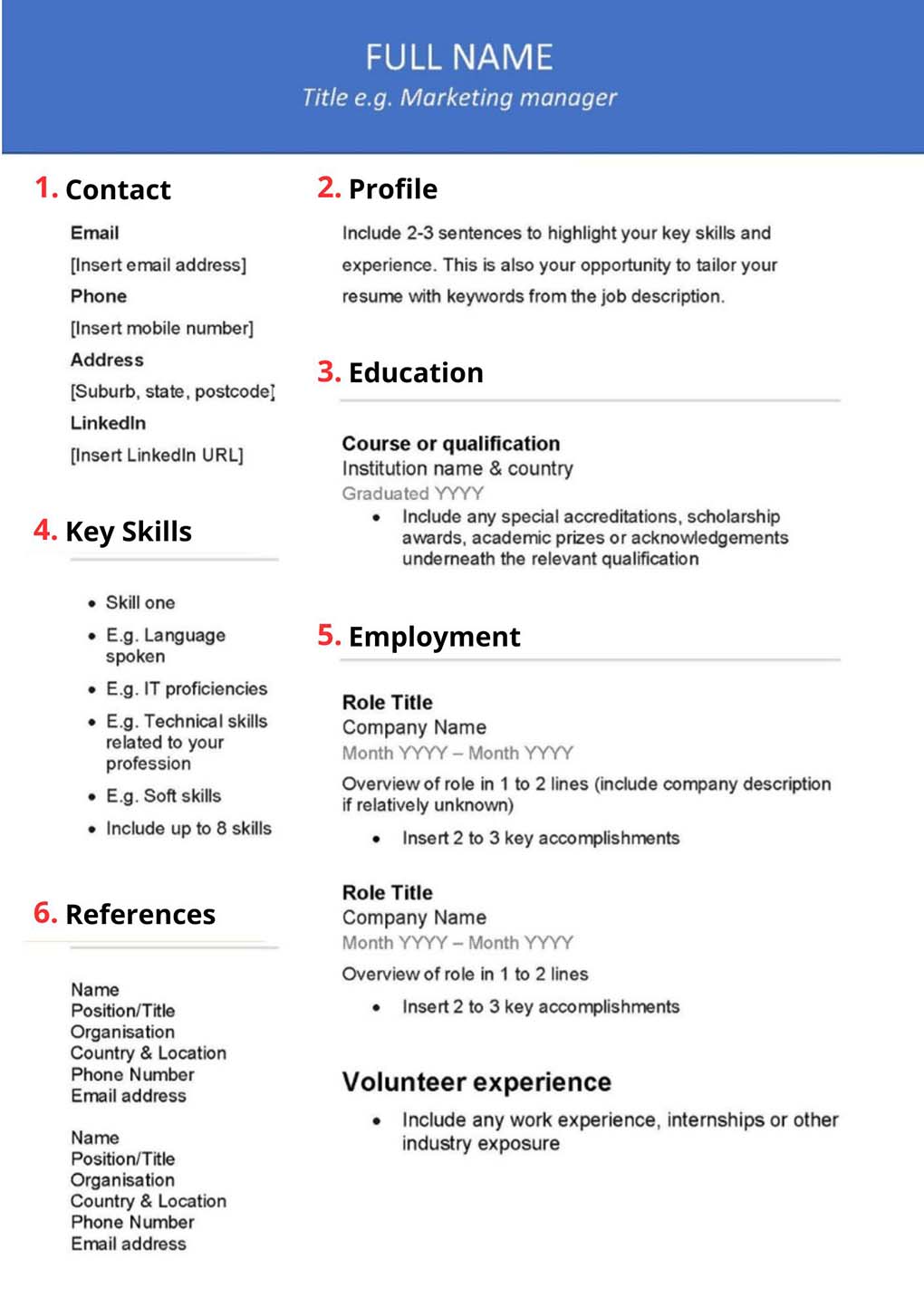Free Australian Resume Template
TO IMPRESS EMPLOYERS
Last updated: June 2025
Your resume needs to convey what makes you the right fit for a particular business and role. But how do you stand out from the hundreds of other resumes when a recruiter or employer might only spend an average of six to seven seconds scanning your document?
Following Australian industry standards is a good start. However, being succinct, professional, relevant and persuasive when sharing your experience, education and skills is what will get you noticed.
In this blog, our Careers Central team will share:
The do’s and don’ts of resume writing
A free Australian resume template for you to download
What you need to write for each section of your resume and
advice for international students new to the local job market.
Former KBS Careers Advisor Kimberly Goh shares expert tips on building a resume that lands interviews - and the common pitfalls to avoid.
DOS AND DON’TS FOR YOUR AUSTRALIAN RESUME
DOS
When writing your resume, you should:
- Aim to keep your resume to two pages in length
- Keep your design simple and professional, with lots of white space.
- Use a simple font like Arial in a font size (e.g 11-12 pt) that’s easy to read.
- Tailor your study and work experience to the role you’re applying for.
- Save in a commonly accepted format – Microsoft Word or PDF is recommended.
- Use correct Australian English spelling and grammar. Grammarly is a great free tool you can use to check your writing.
DON’TS
When writing your resume, you should avoid:
- Including your photo or personal details such as your marital status, gender, race or age.
- Using excessive formatting – avoid italics and underlining.
- Using tables, images, or graphics in your resume, as many Applicant Tracking Systems (ATS) used by recruiters in Australia have difficulty reading these elements accurately. To ensure your resume passes through ATS filters, stick to clean, text-based formatting.
- Using an inappropriate email address – keep it simple and professional, and it should ideally include your first and last name.
- Overcrowding your resume with experience that is over 10 years old or not relevant to the position you’re applying for.
FREE AUSTRALIAN RESUME TEMPLATE
Download our free resume template, designed in collaboration with our expert career advisors at Careers Central.
DOWNLOAD THE TEMPLATEWHAT TO WRITE FOR EACH SECTION
1. Contact details
These details should be highly visible and appear at the top of your resume. Ensure you have customised and hyperlinked your LinkedIn URL.
2. Profile
- Use this section as an opportunity to communicate your career objectives and goals.
- Include 2-3 sentences to highlight your supporting skills and experience.
- Tailor your resume with keywords from the job description.
- Example introductory sentence: Accounting manager with 6+ years of experience and a Master of Accounting qualification, seeking a senior role with a focus on stakeholder management and portfolio growth.
3. Education
- Use reverse chronological order i.e. the most recent qualification first.
- Include any special accreditations, scholarship awards, academic prizes or acknowledgements as bullet points underneath the relevant qualification.
4. Key skills
Identifying and using transferable skills can showcase that you’re a strong candidate and a good cultural fit for a given organisation or team.
Soft skills
These refer to interpersonal attributes, and may include, but are not limited to:
- Adaptability
- Attention to detail
- Teamwork
- Communication
- Creativity
- Decision making
- Leadership
- Multitasking
- Problem-solving
- Time management
Hard/technical skills
These refer to specific proficiencies and certifications that may be relevant to your industry. They may include, but are not limited to:
- Languages spoken
- IT proficiencies and systems
- Accounting or bookkeeping
- Computer programming languages
- Exposure to in-house systems
- Project management
- Research skills
- Writing, editing and search engine optimisation (SEO) skills
Where relevant, provide examples of how you gained this skill in a professional environment. For example, for collaboration, you could write: Drove a successful partnership with Y as part of my role at Z, leading to an X% increase in sales that quarter.
5. Employment history
- Use reverse chronological order i.e. list the most recent job first.
- Don’t include work experience over 10 years.
- Include a company description in the overview section in cases where the company may be unknown.
- Describe your accomplishments in 3-4 bullet points. Each bullet point should focus on action words (e.g. created/managed/led/improved etc.) and the value you contributed. Include measurable results such as budgets, revenue, size of the team, number of reports and profits. For example, ‘within an accounts receivable team of five members, managed portfolio ledger streams of over >$250k/month’.
- Tailor your experience to the role you are applying for by using keywords from the job description.
6. References
If the job advertisement specifically requests references, make sure to include 2-3 references with full contact details .
If references aren't requested, it’s acceptable to leave them off your resume and provide them later when asked by the employer. This will allow you to use that space more effectively - either to expand on your accomplishments or to create more white space for easier readability.
If your reference works at an unfamiliar company or your relationship isn’t obvious, you can briefly explain their relevance underneath their name.
Always ask for permission before listing someone as a reference.

TOP ADVICE FROM OUR CAREERS CENTRAL TEAM
What if I don’t have a lot of work experience yet?
If you’re a student and your educational background is your strongest selling point, you can put your education section first. In place of experience, use your resume as an opportunity to highlight your initiative, commitment and educational achievement.
This might include:
- Education results
- Student engagement e.g., ambassador positions, research or project work
- Internship performance
- Volunteer engagements
- Extracurricular activities
- Professional memberships or affiliations
- Soft and technical skills
If you don’t have any practical work experience in your field of study, an internship is a great way to gain this and looks impressive on a resume. Careers Central can connect Kaplan Business School students with academic internships through our wide network of partner companies and organisations.
What if I’m struggling to write my career profile section?
We recommend you complete this section last as it requires a lot of thought, and the other parts of your resume can help to inform and clarify what you want to say.
The key thing to remember is that this section shouldn’t just focus on what you want, but what value you can bring to your future employer.
Here's a few useful guidelines:
- The first bullet point or sentence of the summary should describe how much experience you have in the industry.
- Review the job description and include keywords that align with your own skills. Quantify your skills by measuring the impact you’ve made in previous roles.
- Aim for 2-3 sentences or three bullet points.
Anything else I need to know as an international student?
Immersing yourself in a new culture shows great resilience, adaptability and resourcefulness, so be confident about what you have to offer.
A few key tips:
- Be in the know. Upskill and learn more about the Australian job market, industry trends and the appropriate resume writing standards.
- If your international job title is uncommon or unclear in the Australian context, consider adapting it to reflect an equivalent local title - as long as it accurately represents your responsibilities and scope of work. Use job search sites like SEEK to find titles that align with your actual experience. When in doubt, you can list your original title and include a brief clarification in brackets.
- Don’t sell yourself short. Use your skills section to state your language fluency skills and any international work experience to highlight your expertise in different markets.










